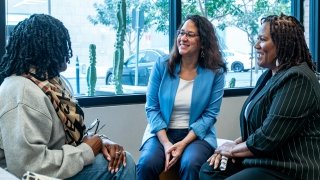When Professor of Clinical Education Christina Kishimoto founded Voice4Equity in 2021, one of her explicit goals was to create spaces for women to convene, “by women, for women,” Kishimoto says.
The first conference that the organization put together, an annual conference called When Women Lead, brings together women superintendents to discuss education policy and leadership, explains Kishimoto, whose prior experience includes serving as superintendent for three different districts as well as the state superintendent for Hawaiʻi. At the 2024 When Women Lead conference, a need for another convening, one focusing on technology, specifically artificial intelligence emerged.
The inaugural Tech, Power & Equity conference took place from January 23 – 25 in Phoenix, Arizona. The conference was designed for “education leaders in the public school system interested in deepening their AI and ed tech knowledge,” Kishimoto says. The 100 attendees of the sold-out conference included superintendents as well as technology leaders in education. The 100-seat cap is intentional—Kishimoto wants to keep the conference small to allow for intimacy and sharing.
The conference covered AI in education from a variety of angles, giving attendees opportunities to share models that have worked in their districts, including practical applications of AI that focus on improving operations, finance processes, transportation services and ensuring the equitable distribution of funds. Also on the agenda and the minds of many in attendance were big questions about AI: ethical questions about its application and how it might impact the cognitive development of students.
Associate Professor of Education Yasemin Copur-Gencturk attended the conference as a speaker, presenting on her work on how AI-powered professional development programs for teachers can offer scalable solutions to bridge access gaps.
Copur-Gencturk connected with Kishimoto in the summer of 2024 at the Breakthrough Leadership Institute, a USC Rossier program created by Associate Dean for Diversity and Community Engagement Darline Robles that gives educational leaders opportunities to explore case studies with USC Rossier faculty facilitators. Kishimoto, a part of the Institutes’s team of facilitators, was introduced to Copur-Gencturk by USC Rossier Director of Community Engagement Xiomara Mateo-Gaxiola at the conference. The two quickly began planning how to incorporate Copur-Gencturk’s work into the Tech-Power & Equity conference.
While at the conference Copur-Gencurk was encouraged by the inclusive and friendly environment, and she found herself doing something she had never done, which is giving the attendees access to the working model of the current professional development program she is working on. She saw the conference as an opportunity to collect feedback from practitioners who cared deeply about her mission and, most importantly, improving the experience of the students in their districts.
“We just want to improve [the program],” Copur-Gencturk says, and the feedback from the attendees is already helping her and her team take steps in that direction. Copur-Gencturk also expresses her gratitude to Irving R. and Virginia Archer Melbo Chair in Educational Administration, Maria Ott, who supported Copur-Gencturk’s participation in the conference.
In addition to discussions of practical applications of AI, concerns about how the new administration might distract from innovation were voiced as well as issues of how educational leaders can make sure they are involved in the design and decision process of how new technologies like AI are integrated into education, Kishimoto says.
Also front of mind is ensuring that the AI technology that is brought into schools has been properly vetted, Copur-Gencturk says. “We must address these biases before [AI technologies] are used in schools. We have to be very responsible, hold ed-tech companies accountable, and test and remove biases before they are integrated into our educational systems.” Copur-Gencturk says.

Copur-Gencturk, who describes herself as somewhat shy, found herself immediately welcomed by the other attendees. At most conferences she attends, she finds herself skipping some sessions, but at Tech, Power & Equity she attended nearly every session, intent to “learn as much I could,” from her fellow presenters. She also attended dinners and other social gatherings with attendees, gaining friends and connections with like-minded women.
“We add some fun to it,” Kishimoto says. Attendees are encouraged to let their hair down—literally—and exchange their high heels for high-top sneakers. Kishimoto, who dons Chuck Taylors for the Voice4Equity conferences, says that the conferences are a “space for us. They are about who we are authentically, about the content. We want to lift up one another, lift other women and learn and grow.”
The conferences are one-way Voice4Equity works toward reaching its goal of increasing the number of women superintendents, in particular women of color.
While women make up over 80% of the teaching workforce, only about 30% of superintendents across the nation are women, Kishimoto says. By creating conferences for women, by women, Kishimoto aims to create a place for women to shine that is outside of the typically male-dominated conferences for superintendents.
In the face of these numbers and the hurdles ahead, Kishimoto says that a line spoken by the conference’s keynote speaker, Lisa Herring, who recently stepped down from her position as strategic advisor to former U.S. Secretary of Education Miguel Cardona, became a de-facto slogan for the conference: “Don’t get distracted by the noise.” Kishimoto and the education leaders in attendance know that “we have to do the most important work for kids. We can’t step back from the work.” Furthermore, Kishimoto says what’s important to keep front of mind is that since 2014, the majority of students served in our public schools are students of color. “Most people don’t realize that,” Kishimoto says. “We are a different nation.”






